In the News
APF Canada's media responses to the latest issues and events in Asia

Al Jazeera
As US and China escalate trade war, the world asks, ‘Who will blink first?’
Al Jazeera, April 16, 2025
Featuring: Vina Nadjibulla, Vice-President Research & Strategy, APF Canada
Excerpt: "A 145-percent tariff will make it impossible for China to sell to the US – the costs on both economies will be exceptionally high... A complete decoupling is almost impossible to contemplate."
Nadjibulla also noted that "who will blink first [between Trump and President Xi Jinping] depends on who can stand more pain and who is better prepared."

The Hill Times
Canadian election outcome not of ‘pivotal strategic importance’ for China and India, say observers
The Hill Times, April 16, 2025
Featuring: Vina Nadjibulla, Vice-President Research & Strategy, APF Canada
Excerpt: In regards to the upcoming Canadian election, Nadjibulla notes that China may be "watching to see what each candidate might be saying about China, and in general, China is interested in making sure that views that are not friendly to it are not being discussed in the context of the election."
When it comes to Canada's Indo-Pacific Strategy introduced in 2022 and the trade war imposed by the Trump Administration, she highlighted that "regardless of who’s the prime minister, if Canada truly wants to diversify and have more options outside the U.S., we need to redouble our efforts on the Indo-Pacific."
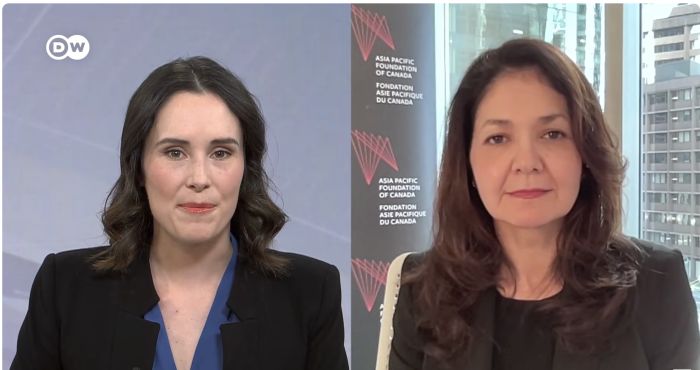
DW News
Trump tariffs: China calls on the US to 'correct its mistakes'
DW News, April 13, 2025
Featuring: Vina Nadjibulla, Vice-President Research & Strategy, APF Canada
Excerpt: "Ultimately China will continue to find alternative markets, make deals with others [in the wake of Trump's tariff announcements] . . . It's going to be very difficult for some of these other economies because they would want to continue to have stable and good relations with China, but on the other hand they want to protect their markets . . . they don't want to see Chinese products that aren't able to come to the U.S. being dumped on their markets and impacting their manufacturing.
"Overall direction of travel is both the U.S. and China are trying to decouple and reroute supply chains."
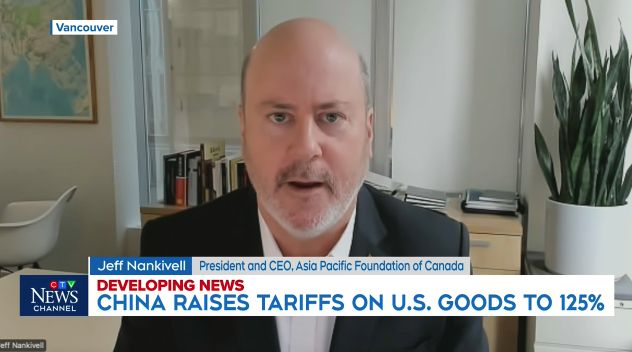
CTV News
CHINA RAISES TARIFFS ON U.S. GOODS TO 125%
CTV News, April 11, 2025
Featuring: Jeff Nankivell, President & CEO, APF Canada
Excerpt: "You're not going to see China backing down anytime soon . . . both sides are anticipating there will be a negotiation somewhere down the road . . . in the coming months.
"China has made a number of moves . . . to present itself as friendly to other countries around the world" to shore up supply chains.
In regard to the argument that Chinese exporters are engaging in unfair trading practices Nankivell says, "China has taken advantage over the years in a number of ways and there is no question that reciprocity hasn't existed . . . so there has been an imbalance, but an imbalance that the rest of the world has seen benefits as well . . . [but China] has the skills, expertise, and supply chains and logistics . . . to become th[is] unique producer of goods."

CBC
What could the trade war between China and the US mean for Canada?
CBC - Radio West with Sarah Penton, April 4, 2025
Featuring: Vina Nadjibulla, Vice-President Research & Strategy, APF Canada
Excerpt: Nadjibulla spoke to host Sarah Penton on the potential impact of Trump's trade agenda and reducing trading between the U.S. and China on global markets, saying: "We are in a full-blown trade war, this is unchartered territory . . . whatever happens here we are all going to be impacted.
"It really is a game of chicken and it depends who is going to blink first and who can tolerate more pain. China is demonstrating a lot of resolve . . . if there is a deal to be made I don't think it'll happen soon.
Canada exports a lot of agricultural goods . . . to China. So there's a slow down in the Chinese economy because of these tariffs and that will impact Canadian exporters as well."
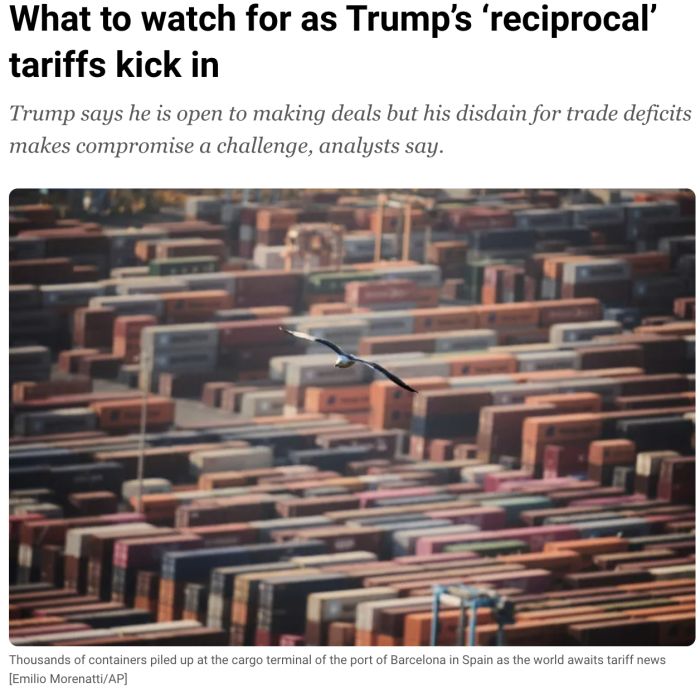
Al Jazeera
What to watch for as Trump’s ‘reciprocal’ tariffs kick in
Al Jazeera, April 9, 2025
Featuring: Vina Nadjibulla, Vice-President Research & Strategy, APF Canada
Excerpt: "A 100 per cent China tariff will shut off all Chinese exports to the US."
Nadjibulla notes that this tariff agenda from the Trump administration will drive up prices in a U.S. economy heavily reliant on Chinese imports and push China to seek export trading in other markets such as Europe and Southeast Asia.
“The more China-US [trade war] escalates, the more the repercussions on Southeast Asian nations and other economies around the world."
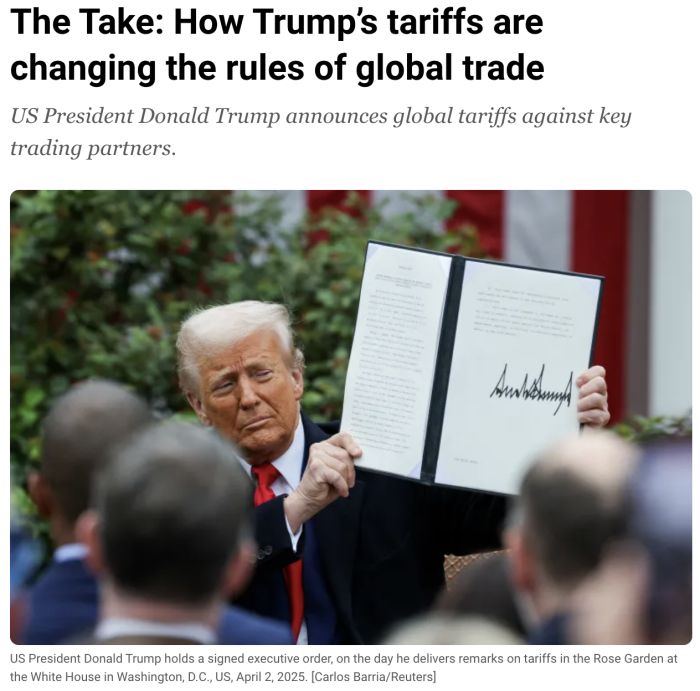
Al Jazeera
The Take: How Trump’s tariffs are changing the rules of global trade
Al Jazeera - The Take podcast, April 7, 2025
Featuring: Vina Nadjibulla, Vice-President Research & Strategy, APF Canada
Excerpt: "There are no words to describe how unprecedented this is, both in terms of scale . . . but also the way it was rolled out. On Tuesday, nobody knew what to expect.
The U.S. is the biggest consumer market . . . and basically President Trump said 'We are closed for business.'' [A]nd this will be hugely devastating for the U.S economy and other economies around the world.
It's the largest trade war in modern history. It will have implications on everything: on how we buy stuff, on how we make stuff, employment, inflation, all of those things. And it tries to remake 80 years of global trade policy that the U.S. led."
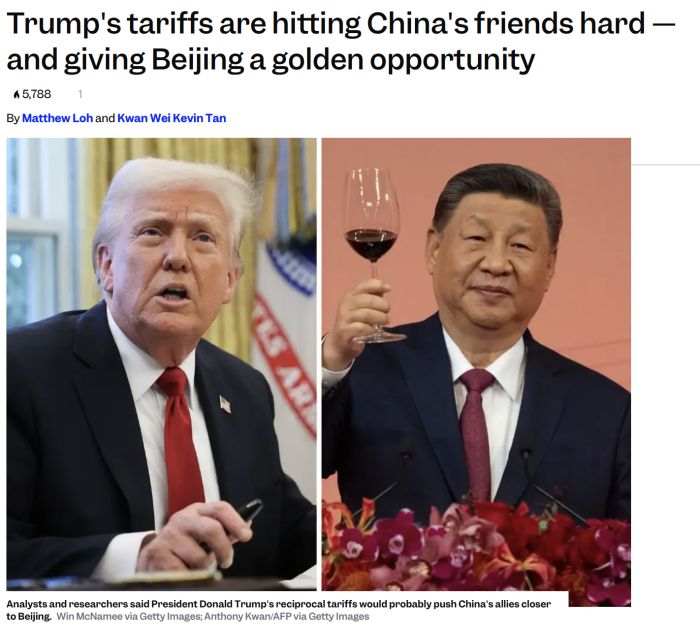
Business Insider
Trump's tariffs are hitting China's friends hard — and giving Beijing a golden opportunity
Business Insider, April 4, 2025
Featuring: Vina Nadjibulla, Vice-President Research & Strategy, APF Canada
Excerpt: "Strategically, the US is now handing a victory to China in the US-China competition.
"If the US is preoccupied with competing with China, it is ceding ground and losing influence by essentially making China the only possible alternative for many of these economies" affected by President Trump's tariffs.
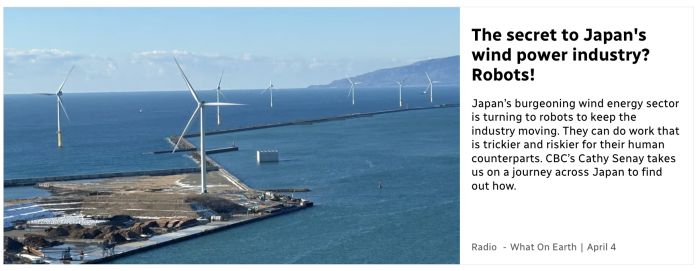
CBC News
The secret to Japan’s wind power industry? Robots!
CBC - What On Earth, March 22, 2025
Featuring: Cathy Senay, APF Canada 2024-25 Media Fellow
Topic: Wind turbines have been in operation for more than two years now. The project provides energy to more than 37,00 households.
But Japan "has the fast rate of population aging in the world . . . it's a big challenge . . . the robotics solution is part of the country's culture."
The Japanese clean energy sector is looking to automate the maintenance of offshore wind turbines in the face of an aging, and thus reduced, working population. Cathy Senay visited some of these wind turbine companies in Japan to understood how robots are innovating Japan's clean energy initiative.
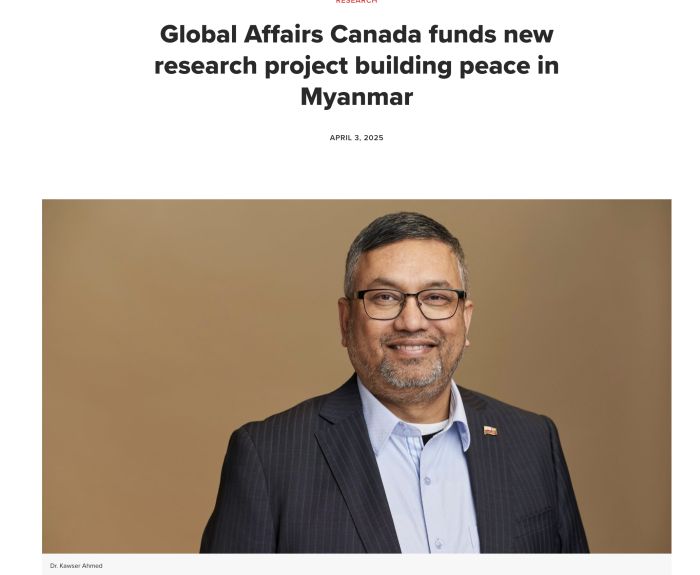
U of Winnipeg News
Global Affairs Canada funds new research project building peace in Myanmar
University of Winnipeg News, April 3, 2025
Featuring: Canada-in-Asia Conference (CIAC) 2025
Topic: "Following Canada’s Minister of Export Promotion, International Trade and Economic Development’s visit to Singapore and Brunei in February 2025 for the third annual Canada-in-Asia Conference (CIAC), she announced the funding of the first $4 million over four years, under the Regional Connectivity Envelope (RCE), to support Canadian non-governmental organizations, Indigenous organizations representing First Nations, Inuit and Métis, and academics as they pursue initiatives with Indo-Pacific partners in key areas of mutual interest such as security, climate, and trade. "
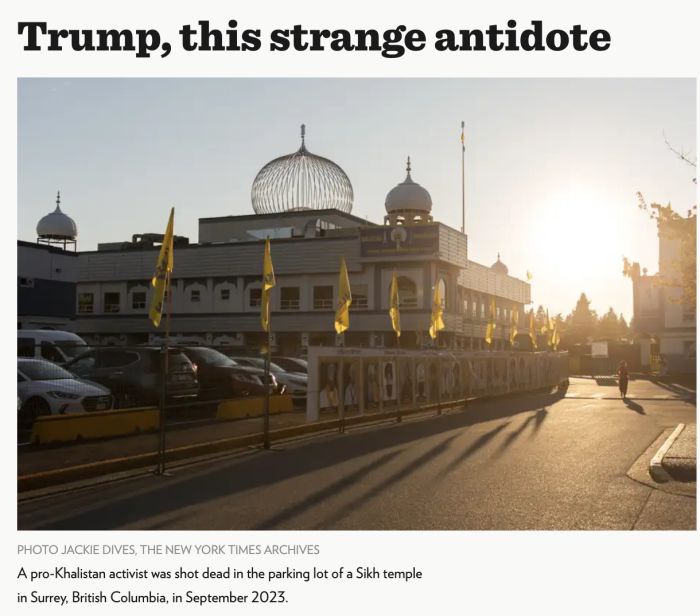
La Presse
Trump, this strange antidote
La Presse, April 1, 2025
Featuring: Dr. Raja Mohan, APF Canada Indo-Pacific Visiting Scholar and visiting professor at the Institute of South Asian Studies, and Vina Nadjibulla, Vice-President Research & Strategy, APF Canada.
Topic: Dr. Mohan notes that "both [Canada and India] are adept at playing the game of who's right, but there comes a time when it's necessary to take a deeper look at the relationship. And my feeling is that the arrival of a new prime minister in Canada gives India that opportunity."
Meanwhile, Nadjibulla points out that exploring economic partnerships with India does not mean Canada should "sideline pressing issues. There has been a clear violation of Canada's sovereignty; we cannot look the other way. We must ensure that there are procedures in place to ensure justice and accountability, but we must also rebuild trust between our police services, which has been undermined for 40 years. Canada must look to its own national interest and not focus the relationship solely on diaspora issues."
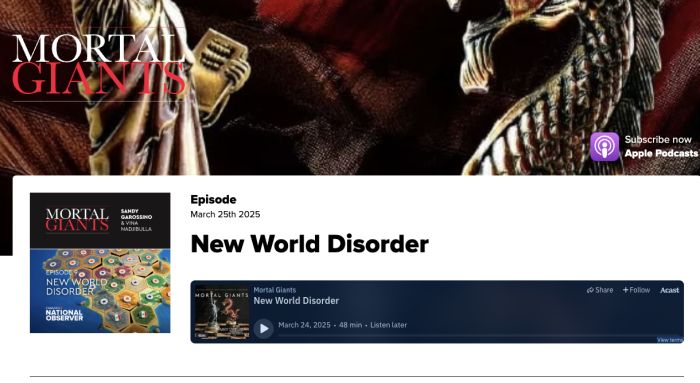
National Observer
New World Disorder
National Observer - Mortal Giants Podcast, March 25, 2025
Featuring: Vina Nadjibulla, Vice-President, Research & Strategy, APF Canada
Topic: Trump "believes in a world which is very much a zero sum transactional one. He doesn't believe in.... enlightened self interested, that it benefits the U.S. to be the leader of a rules based international order.
...he dosent believe you can have winners through trade. To him someone has to be a winner and someone has to be a loser...
President Trump doesn't believe in that positive sum foreign policy.... he believe the world has treated the U.S. unfairly... that the US has somehow been taken advantage of rather than recognizing the U.S. has been the most innovative and prosperous country in the world... and that alliances are sources of strength."

CBC Your World Tonight
Your World Tonight - March 22
CBC - Your World Tonight, March 22, 2025
Featuring: Cathy Senay, APF Canada 2024-25 Media Fellow
Topic: Under the APF Canada Media Fellowship banner, Senjay travelled to Japan to explore the country’s use of industrial and humanoid robots to meet the demographic challenges of a shrinking workforce and aging population.
"At the entrance of [a Japanese] nursing home, a small robot called Paro greets visitors...
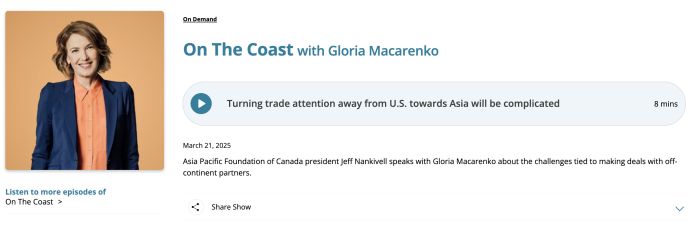
CBC News
Turning trade attention away from U.S. towards Asia will be complicated
CBC – On The Coast with Gloria Macarenko, March 21, 2025
Featuring: Jeff Nankivell, President & CEO, APF Canada
Excerpt: “We haven't seen any significant decline in [trade] despite the diplomatic tensions between Canada and China, and trade with India is also very significant, and trade with other parts of Asia is growing . . . this only becomes more important given the uncertainties around our export markets in the United States.
"I just got off the plane from a visit to New Delhi and Tokyo, and the interest of Canadian businesses to be exploring new markets, the ones who are not already engaged in parts of Asia, they're making first-time visits . . . we are starting to see an uptick in the interest in exploring opportunities.”
When discussing Canada's tariffs on EVs from China, Nankivell stressed that Canada "should position ourselves as a rules abiding member of the international trading system. Arbitrary actions, simply following in lock step with what the U.S. doesn't look good for us in terms of those [overseas trade] relationships. Whether [those measures] can be rolled back at some point is tied up in the dynamic of the Canada-U.S. two way relationship."
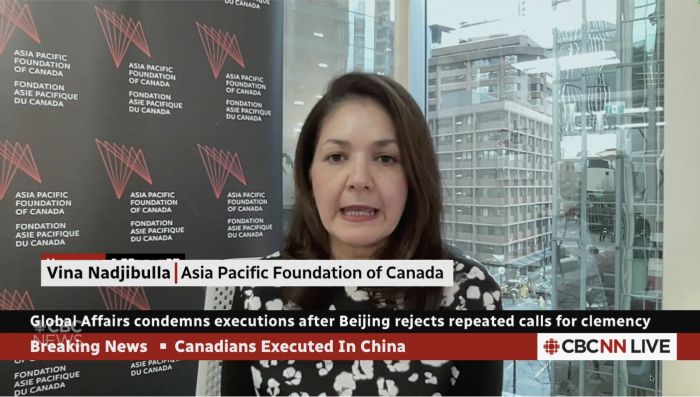
CBC News
Canadians Executed in China: CBC News Speaks with Vina Nadjibulla of the Asia Pacific Foundation of Canada
CBC News, March 19, 2025
Featuring: Vina Nadjibulla, Vice-President Research & Strategy, APF Canada
Excerpt: Nadjibulla responds to the news this week, first reported by the Globe and Mail, that China executed Canadian citizens on drug-related charges earlier this year, as confirmed by Global Affairs Canada:
"It's a deeply troubling development. Execution of foreigns is extremely rare even in the Chinese criminal justice system, which has a 99 per cent conviction rate and carries out more executions than any other country in the world . . .
It is a reminder of the nature of the Chinese Communist regime and the fact that we need to be clear eyed when dealing with them. For those people who were hoping that in the current climate, China may wish to strengthen relations with Canada and may wish to deepen partnerships, this shows that that's really not the case because based on the statement from the Government of Canada it seems like there were efforts to
secure clemency for these individuals. The fact that those efforts did not
succeed shows that there was some resistance to a strengthening of
relations at this time . . .
It was absolutely right for the Government of Canada to condemn these executions. We have stood strongly against the death penalty around the world and certainly in the case of China. It is a profoundly alarming development, my heart breaks for the families of individuals involved . . .
For those who are thinking that this is the moment for us to deepen relations with China, this is a chilling development."
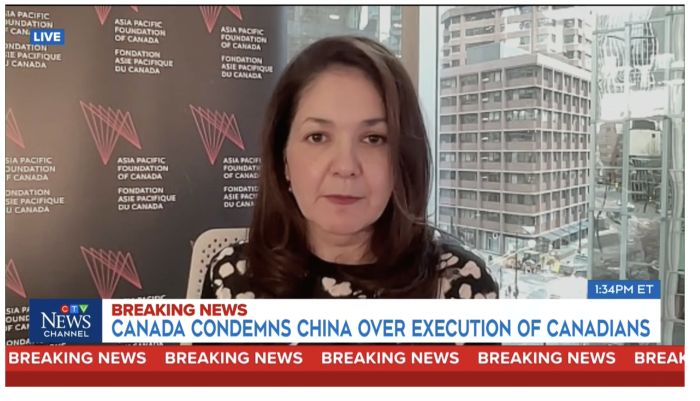
CTV News
Canada condemns execution of two Canadians in China
CTV News, March 19, 2025
Featuring: Vina Nadjibulla, Vice-President Research & Strategy, APF Canada
Excerpt: "Execution of Westerners in China is rare. The last such known case, publicly known case, was more than 10 years ago . . . So this is a deeply troubling development . . . there are more than 100 Canadians that we are aware of that are in Chinese prisons right now. The details of these particular cases are not known, but again, it's something that is a reminder of the kind of regime that we're dealing with in China.
This development shows that that [China] may not be interested in deepening ties with Canada . . . because clearly Canadian government officials tried to intervene, tried to ask for clemency at the highest levels according to the Global Affairs statement. So the fact that China was not willing to make any concessions on this, that it chose to go ahead with the executions and the timing of this suggests that perhaps the desire to normalize or stabilize relations is not actually sincere on their side.
Of course, we have to bear in mind that right now we're also in a dispute with China over trade-related matters. So all of this comes together and makes for really difficult diplomacy with China, which is a critical actor in the Indo-Pacific and globally."
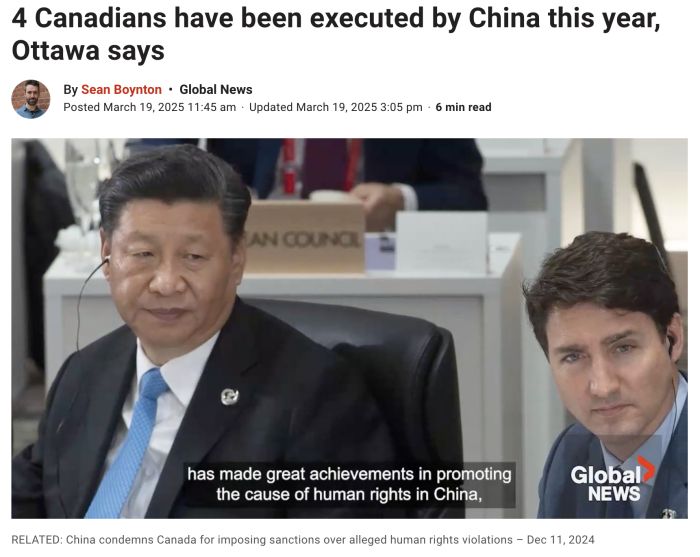
Global News
4 Canadians have been executed by China this year, Ottawa says
Global News, March 19, 2025
Featuring: Vina Nadjibulla, Vice-President Research & Strategy, APF Canada
Excerpt: "This, to me, signals that China is not in the mood to make any concessions, and maybe that is not something that China’s interested in doing right now with Canada...
I don’t foresee a significant improvement given these signals that we’re getting from China."
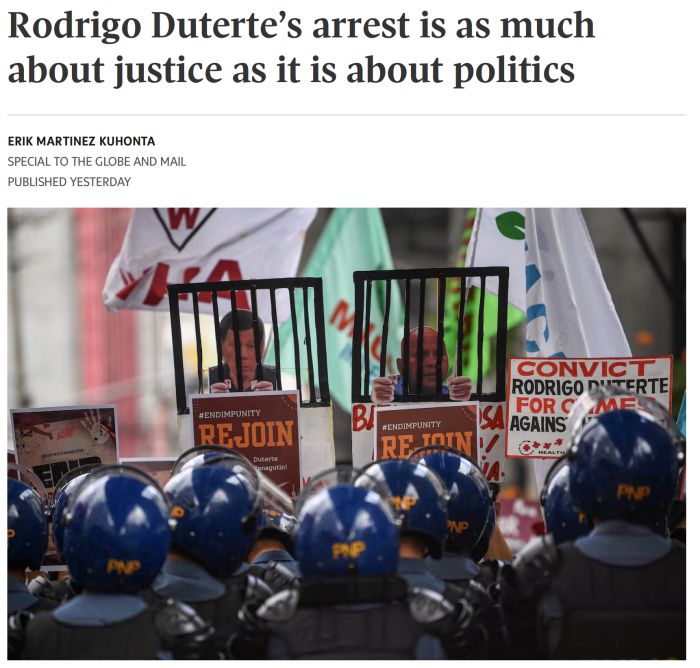
The Globe and Mail
Rodrigo Duterte’s arrest is as much about justice as it is about politics
The Globe and Mail, March 16, 2025
Featuring: Erik Kuhonta, John H. McArthur Research Fellow
Excerpt: "The International Criminal Court’s stunning arrest last week of former president of thePhilippines, Rodrigo Duterte, on charges of crimes against humanity was a powerful strike for human rights and justice. It was also a decisive move by the current President,Ferdinand “Bongbong” Marcos, Jr., against the Duterte family . . .
Although it may be ironic that Bongbong Marcos can now make claims to the mantle of human rights, the law is nonetheless playing a crucial role in recalibrating the impunity of Rodrigo Duterte’s six long years of extrajudicial killings. Transitional justice may have failed the Philippines in the past, but it has now reappeared under the most unexpected circumstances"
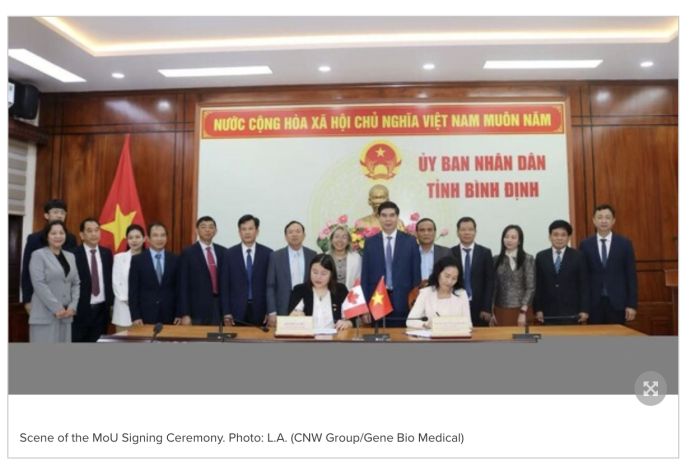
Newswire
Gene Bio Medical and BIDIPHAR Announce Strategic Joint Venture to Revolutionize Global Healthcare
Newswire/Gene Bio Medical, March 17, 2025
Featuring: APF Canada's Women-only Business Mission.
Excerpt: "Gene Bio Medical (GBM), a leading Canadian biotechnology company specializing in molecular diagnostics, has signed a Memorandum of Understanding (MOU) with Bình Định Pharmaceutical - Medical Equipment Joint Stock Company (BIDIPHAR) to establish a large-scale production facility in Bình Định, Vietnam.
In November 2024, the Women's Trade mission led by Asia Pacific Foundation of Canada, Vice president Christine Nakamura and Director A.W Lee. visited Vietnam again and met with BIDIPHAR's CEO Ms. Phạm Thị Thanh Hương in Ho Chi Minh City, reaching a preliminary agreement."
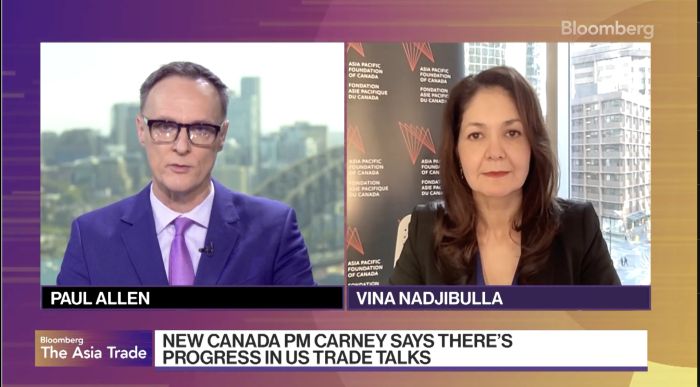
Bloomberg
Bloomberg: The Asia Trade 3/17/2025
Bloomberg, March 16, 2025
Featuring: Vina Nadjibulla, Vice-President Research & Strategy, APF Canada
Excerpt: "We have seen more minor de-escalation.. and of course the change in leadership here... does provide an opportunity for maybe some de-escalation...
No matter what happens there has been a profound shift in the way Canadians view the U.S., our relationship with the U.S., and U.S. power in the world... that shift is going to be enduring the level of mistrust.. anger... and betrayal.. that is not something that will go away even if we see the necessary reduction in the threats and tariffs in this trade war."
Full segment from Nadjibulla begins at 1:12:56.
